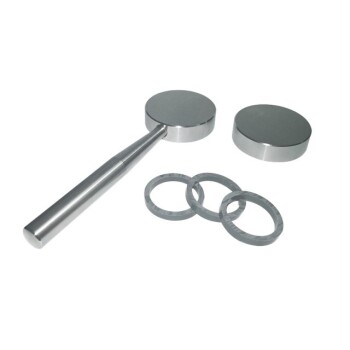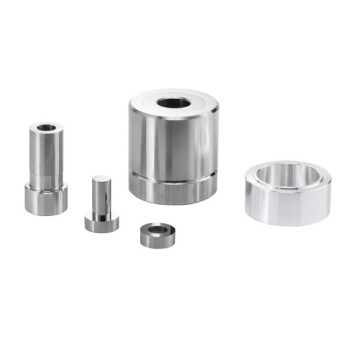In the modern laboratory, a hydraulic press serves two fundamental purposes: preparing materials for analysis and testing their physical limits. It uses hydraulic fluid to generate significant compressive force, allowing researchers to transform samples into standardized forms or to study their structural integrity under immense, controlled pressure.
A hydraulic press is more than a simple compression device; it is a precision instrument for creating highly uniform samples and for quantifying a material's response to force. Its value lies not in brute strength alone, but in the controlled and repeatable application of that strength, which is essential for reliable scientific data.

The Core Functions: Preparation and Testing
The versatility of a laboratory press stems from its ability to apply high force in a small footprint. This capability is harnessed for two distinct, yet related, categories of tasks.
Sample Preparation for Analysis
One of the most frequent uses of a laboratory press is sample preparation, particularly for analytical chemistry. It excels at converting powders or other loose materials into a more suitable form for measurement.
This process, often called pelletizing, involves compacting a powdered sample into a dense, solid disc. Techniques like Fourier-transform infrared (FTIR) and X-ray fluorescence (XRF) spectroscopy require samples to have a uniform density and a smooth surface to produce accurate and repeatable results.
The press is also crucial for powder compaction in materials science, where it's used to form composite materials or prepare pharmaceutical compounds for further research and development.
Material Strength and Durability Testing
The second primary application is material testing. By applying a measured amount of force, a hydraulic press can determine a material's compressive strength, durability, and behavior under stress.
Engineers and materials scientists use it to test the limits of ceramics, concrete samples, and newly developed composites. This data is critical for quality control, safety validation, and fundamental research into how different materials fail under load.
Why a Hydraulic Press is the Right Tool
While other tools can apply force, the hydraulic press is dominant in the lab for several key reasons that center on control and efficiency.
Unmatched Force Generation
A hydraulic press operates on Pascal's principle, where a small force applied to a contained fluid generates a significantly multiplied force at another point. This allows a compact, benchtop machine to exert tons of force with minimal operator effort or energy consumption.
Precision and Control
Modern laboratory presses offer a high degree of precision and control. They aren't simply for crushing; they allow the user to apply a specific, targeted amount of pressure. This control is essential for creating consistent pellets or for designing experiments that test material failure at exact force thresholds.
Versatility Across Disciplines
The same basic device can be used in a wide range of fields. Chemists use it for spectroscopy prep, materials scientists for creating composites, engineers for stress testing, and even biologists for extracting compounds from tough cellular structures. This adaptability makes it a cost-effective and valuable asset for nearly any research environment.
Understanding the Trade-offs and Considerations
While powerful, a hydraulic press has specific strengths and requires careful operation. Understanding its limitations is key to using it effectively.
A Focus on Compressive Force
A standard hydraulic press is designed exclusively for compressive force—pushing, crushing, and compacting. It is not suitable for tensile (pulling) or torsional (twisting) tests without specialized adapters.
Safety is Paramount
The immense forces generated by a hydraulic press can be extremely dangerous. Modern units are equipped with safety features like shields and overload protection, but proper training is non-negotiable. Operators must understand the equipment's limits and follow all safety protocols to prevent injury or damage.
Manual vs. Automated Presses
Presses come in manual and automated versions. Manual presses are excellent for lower-throughput applications and where different pressures are needed for various samples. Automated presses provide superior consistency for high-volume, repetitive tasks where the exact same force must be applied every time.
Making the Right Choice for Your Lab
To determine if a hydraulic press fits your workflow, consider your ultimate research goal.
- If your primary focus is analytical chemistry: You need a press to create the high-quality, uniform pellets essential for accurate spectroscopic analysis.
- If your primary focus is materials science or engineering: A press is the definitive tool for precisely quantifying the compressive strength and behavior of your materials.
- If your primary focus is research and development: The press is a versatile instrument for compacting novel powders, prototyping new materials, and exploring physical properties.
Ultimately, the laboratory hydraulic press is a foundational tool that transforms raw, unstandardized materials into quantifiable data and robustly tested components.
Summary Table:
| Function | Key Applications |
|---|---|
| Sample Preparation | Pelletizing for FTIR/XRF spectroscopy, powder compaction for materials science and pharmaceuticals |
| Material Testing | Compressive strength testing for ceramics, concrete, and composites in quality control and research |
Ready to enhance your lab's capabilities with a reliable hydraulic press? KINTEK specializes in high-quality lab press machines, including automatic, isostatic, and heated models, designed to meet the precise needs of laboratories in analytical chemistry, materials science, and R&D. Our presses deliver unmatched force control and versatility, helping you achieve consistent results and accelerate your research. Contact us today to discuss how we can support your specific applications and boost efficiency!
Visual Guide

Related Products
- Laboratory Hydraulic Press 2T Lab Pellet Press for KBR FTIR
- Manual Laboratory Hydraulic Press Lab Pellet Press
- Automatic Laboratory Hydraulic Press for XRF and KBR Pellet Pressing
- Automatic Laboratory Hydraulic Press Lab Pellet Press Machine
- Laboratory Hydraulic Press Lab Pellet Press Button Battery Press
People Also Ask
- What role does a laboratory hydraulic press play in carbonate powder prep? Optimize Your Sample Analysis
- Why must a laboratory hydraulic press be used for pelletizing samples for FTIR? Achieve Precision in Spectral Data
- What role does a high-pressure laboratory hydraulic press play in KBr pellet preparation? Optimize FTIR Accuracy
- How is a laboratory hydraulic press used for Tb(III)-Organic Framework FT-IR samples? Expert Pellet Pressing Guide
- Why is sample uniformity critical when using a laboratory hydraulic press for humic acid KBr pellets? Achieve FTIR Accuracy



















